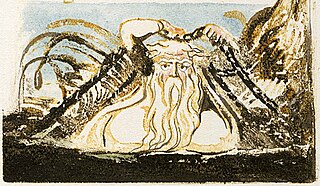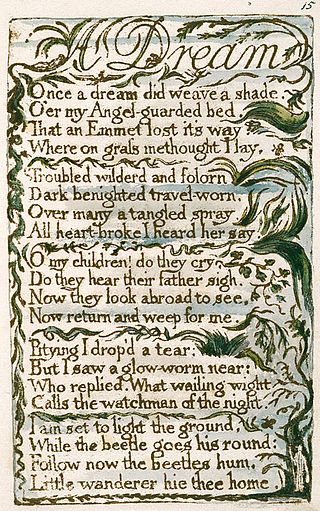
"The Tyger" is a poem by the English poet William Blake, published in 1794 as part of his Songs of Experience collection and rising to prominence in the romantic period. The poem is one of the most anthologised in the English literary canon, and has been the subject of both literary criticism and many adaptations, including various musical versions. The poem explores and questions Christian religious paradigms prevalent in late 18th century and early 19th century England, discussing God's intention and motivation for creating both the "Lamb" and the eponymous "Tyger."

Songs of Innocence and of Experience is a collection of illustrated poems by William Blake. Originally, Blake illuminated and bound Songs of Innocence and Songs of Experience separately. It was only in 1794 that Blake combined the two sets of poems into a volume titled Songs of Innocence and of Experience Shewing the Two Contrary States of the Human Soul. Even after beginning to print the poems together, Blake continued to produce individual volumes for each of the two sets of poetry.

"London" is a poem by William Blake, published in Songs of Experience in 1794. It is one of the few poems in Songs of Experience that does not have a corresponding poem in Songs of Innocence. Blake lived in London so writes of it as a resident rather than a visitor. The poems reference the "Two Contrary States of the Human Soul". The "Songs of Innocence" section contains poems which reference love, childhood and nature. Critics have suggested that the poems illustrate the effects of modernity on people and nature, through the discussion of dangerous industrial conditions, child labour, prostitution and poverty.

"The Little Black Boy" is a poem by William Blake featured in his collection Songs of Innocence published in 1789. The work was published during a period when slavery was still legal and the campaign for the abolition of slavery was in its nascent stages.

Holy Thursday is a poem by William Blake, from his 1789 book of poems Songs of Innocence.

"Ah! Sun-flower" is an illustrated poem written by the English poet, painter and printmaker William Blake. It was published as part of his collection Songs of Experience in 1794. It is one of only four poems in Songs of Experience not found in the "Notebook".

Earth's Answer is a poem by William Blake within his larger collection called Songs of Innocence and of Experience. It is the response to the previous poem in The Songs of Experience-- Introduction . In the Introduction, the bard asks the Earth to wake up and claim ownership. In this poem, the feminine Earth responds.

The Little Girl Lost is a 1794 poem published by William Blake in his collection Songs of Innocence and of Experience. According to scholar, Grevel Lindop, this poem represents Blake's pattern of the transition between "the spontaneous, imaginative Innocence of childhood" to the "complex and mature adult state of Experience."

"A Poison Tree" is a poem written by William Blake, published in 1794 as part of his Songs of Experience collection. It describes the narrator's repressed feelings of anger towards an individual, emotions which eventually lead to murder. The poem explores themes of indignation, revenge, and more generally the fallen state of mankind.

"The Shepherd" is a poem from William Blake's Songs of Innocence (1789). This collection of songs was published individually four times before it was combined with the Songs of Experience for 12 editions which created the joint collection Songs of Innocence and of Experience (1794). Blake produced all of the illuminated printings himself beginning in 1789. Each publication of the songs has the plates in a different order, and sixteen other plates were published posthumously.

"On Another's Sorrow" is a poem by the English poet William Blake. The poem discusses human and divine empathy and compassion. It was published as part of the Songs of Innocence and of Experience in 1789 as the last song in the Songs of Innocence section.

Songs of Experience is the second studio album by American composer and producer David Axelrod. It was released in October 1969 by Capitol Records. Axelrod composed, arranged, and produced the album while recording with session musicians such as guitarist Al Casey, bassist Carol Kaye, drummer Earl Palmer, and conductor Don Randi.

"The Human Abstract" is a poem written by the English poet William Blake. It was published as part of his collection Songs of Experience in 1794. The poem was originally drafted in Blake's notebook and was later revised for as part of publication in Songs of Experience. Critics of the poem have noted it as demonstrative of Blake's metaphysical poetry and its emphasis on the tension between the human and the divine.

Introduction to the Songs of Experience is a poem written by the English poet William Blake. It was etched and published as part of his collection Songs of Innocence and of Experience in 1794.

The Voice of the Ancient Bard is a poem written by the English poet William Blake. It was published as part of his collection Songs of Innocence in 1789, but later moved to Songs of Experience, the second part of the larger collection Songs of Innocence and of Experience, 1794.
"Night" is a poem in the illuminated 1789 collection Songs of Innocence by William Blake, later incorporated into the larger compilation Songs of Innocence and of Experience. "Night" speaks about the coming of evil when darkness arrives, as angels protect and keep the sheep from the impending dangers.

Spring is a lyric poem written and illustrated by William Blake. It was first published in Songs of Innocence (1789) and later in Songs of Innocence and Experience (1794).

"The Little Boy Found" is a poem by William Blake first published in the collection Songs of Innocence in 1789. Songs of Innocence was printed using illuminated printing, a style Blake created. By integrating the images with the poems the reader was better able to understand the meaning behind each of Blake's poems.

"A Dream" is a poem by English poet William Blake. The poem was first published in 1789 as part of Blake's collection of poems entitled Songs of Innocence.
Ten Blake Songs is a song cycle for tenor or soprano voice and oboe composed over the Christmas period of 1957 by Ralph Vaughan Williams (1872–1958), for the 1958 film The Vision of William Blake by Guy Brenton for Morse Films. The first nine songs are from Songs of Innocence and of Experience by the English poet and visionary William Blake (1757–1827); the tenth (Eternity) is from Several Questions Answered from the poet's notebook. The cycle is dedicated to the tenor Wilfred Brown and the oboist Janet Craxton. It was first performed in concert and broadcast on the BBC Third Programme on 8 October 1958, shortly after the composer's death.


















